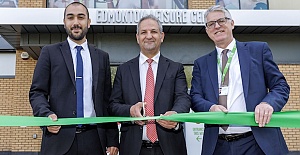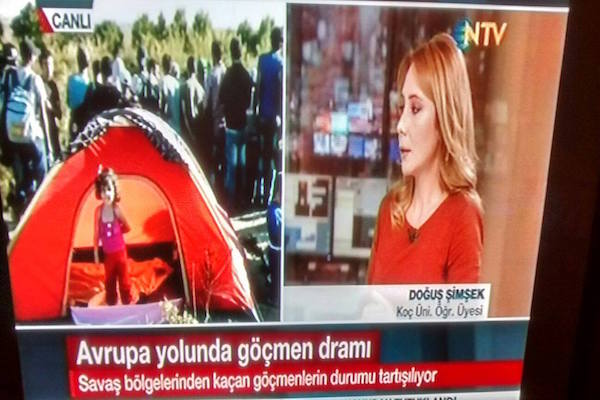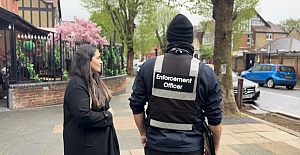Due to the civil war in their home country, millions of displaced Syrians are trying to survive within the scope of the posited identities that the society decides upon. Although a set of regulations related to Syrian asylum seekers’ access to the substantial rights has been made, the existence of Syrian asylum seekers is still considered a temporary crisis in Turkey and the approach is far from being grounded on rights and freedoms.Syrian refugees set an example for the largest refugee flow since the second world war. According to the data taken from United Nations High Commissioner for Refugees (UNHCR) in October 2015, a total of 4,180,631 Syrians had to leave their country. Most of them have taken refuge in neighbouring countries while some did in European countries.[1] Hence they have almost no chance to choose. Under these circumstances, Syrian asylum seekers, who constitute the newest example of the global forced migration, differ from the asylum seekers and refugees in the Europe, in terms of the reason for the asylum, the number of the refugees, the country they took refuge in and the asylum policy of that country.
Latest data of the UNHCR indicates that in total 2,072,290[2] registered Syrian asylum seekers are present in Turkey and it is believed that there are even more asylum seekers together with the unregistered ones. Having an open door policy towards the Syrian asylum seekers, Turkey hosts the highest number of Syrian asylum seekers. First group of asylum seekers, 252 people, entered Turkey on April 29, 2011.[3] This first group had been settled in the refugee camps established in the city of Hatay and firstly identified as ‘guests.’ Subsequently, in a circular letter issued by the prime ministry, it was reported that these asylum seekers were under “temporary protection.”[4]
Syrian Refugees in Turkey: Unheard Voices
Author: Dr. Doğuş Şimşek, Research Fellow at Migration Research Centre (MireKoc) at Koç University Date: Jan 04, 2016 New Post, Society and Culture

Syrian Refugees in Turkey: Unheard Voices
Geneva Convention that was signed in 1951, defines the refugees as individuals who escaped persecution and conflict, and are unable or unwilling to return to their home countries. Therefore, people can be accorded the status of refugee in the country where they find asylum. Although Turkish constitution is based on the 1951 Geneva Convention since 1968; in the Turkish refugee law, the concept of refugees has been determined within the scope of geographical restriction unlike the definitions of the international law. That is why Turkey can grant the status of a refugee only to the citizens of the member states of the Council of Europe. People from non-member states of the Council of Europe are provided “temporary protection” allowing residence in Turkey, until they are accepted as refugees by a third country[5] in the framework of the 1994 Asylum Regulation. Syrians who sought asylum in Turkey, have been accepted as asylum seekers and the geographical restrictions have to be abolished to give them a refugee status. This situation in turn, creates obstacles related to their rights and security.
Although “Law on Foreigners and International Protection,” which was approved on April 4, 2013 and implemented in April 2014, offers a legal framework for providing the needs and security of the Syrian asylum seekers, it does not propose permanent solutions about their rights and living conditions.[6] 22 articles of the aforementioned regulation prescribe to issue temporary protection identity document to the foreigners under the title of temporary protection in Turkey in order to enable them to perform their social and legal operations. The legislation states that people with this identity document will be provided with health and education services, access to the labour market, social assistance and services.

Syrian asylum seekers living outside the camps have to find accommodation on their own. Most of them have to live under bad and/or inadequate conditions due to the lack of financial sources. According to the Ministry of Education’s circular issued in September 2014 on the foreigners’ access to education, temporary protection beneficiaries are supposed to have access to educational services given in the schools in all cities that are inspected by the Ministry of Education and in the temporary educational centres. In order to register to the schools or to the temporary education centres, one needs to have a residence permit, a temporary protection identity document or a foreigner identification document. However, this prevents the unregistered asylum seekers from getting access to education services.
Asylum seekers do have the right to access to health services, but to a limited extent. According to the regulation, asylum seekers are expected to afford the medical costs by themselves for the organ transplantation, prosthesis, orthesis, haemodialysis or any long term treatment of chronic illnesses. The work permit of the asylum seekers and of the refugees in Turkey is subject to the law no. 4817 on work permits for foreigners. Temporary Protection Regulation issued by the Ministry of Family and Social Policies in November 2014 states that the ones with temporary protection identity documents, namely the registered refugees are eligible to apply to the Ministry of Labour and Social Security for permit to work in the sectors, business lines and geographical regions determined by the cabinet.[7]2 In February 2015, the Ministry of Labour and Social Security asserted their plans to regulate the situation of the Syrian refugees, but no regulation has been implemented yet.
Although a set of regulations related to Syrian asylum seekers’ access to the substantial rights has been made, ‘the existence of Syrian asylum seekers’ is still considered a temporary crisis in Turkey and the approach is far from being grounded on rights and freedoms.
Syrian Asylum Seekers in Turkey
Data declared in August by the Directorate General of Migration Management under the Ministry of Interior indicates that only 262,134 people among more than 2 million Syrian asylum seekers in Turkey live in 25 refugee camps in 10 cities. 90% of the Syrian asylum seekers reside outside of the camps. Most important problems that the Syrian asylum seekers, who have to survive through their own means, face include high rental prices, being obliged to work informally due to the government policies together with being exposed to exploitation, racism and discrimination; lack of legal status and insurance, lack of medical treatment especially for those who have chronic illnesses, high medicine prices as well as lack of opportunity to send their children to the schools.
This ‘guest’ status, which includes legal gaps and does not have any international validity, also causes racist and discriminatory discourses in the society against Syrian asylum seekers apart from the restrictions on their access to basic rights. Claiming that there has been enough number of privileges given to Syrian asylum seekers and that they have to go back now, the local community attempts to lynch Syrians in several cities of Turkey.
Since the spring 2014, there have been racist attacks against Syrian asylum seekers in many Turkish cities. Syrian asylum seekers have still been exposed to attacks by local communities for various reasons such as causing housing rents to increase, pushing up the unemployment rate due to their lower wages compared to Turkish citizens, increasing the crime rate and even giving rise to traffic jam. In Ankara, there have been marches protesting the Syrian asylum seekers while their houses were burnt. They have been subject of the attacks by the racist groups in Gaziantep too. Following the murder of a Syrian asylum seeker by his/her landlord from Turkey, the local community attacked the Syrians in the streets and parks with sticks and knifes, and 10 Syrians got injured. In İstanbul’s İkitelli neighbourhood, after the claim that a woman was harassed, local residents damaged some cars, apartments and offices belonged to the Syrians. Attacks against Syrian asylum seekers have also spread in Şanlıurfa, Kilis, Kahramanmaraş, İzmir, Kayseri, Adana and Antalya.
Because of the lack of a legal status, most asylum seekers do not feel secure. In addition to this, they emphasise that they can not gain a place in the society –emotionally or structurally–, they can not find jobs, their labour is exploited because they are forced to work informally and they are having difficulties in making a life for themselves.[8] Legal regulations must be made in order to prevent the ever-increasing and not-wanted-to-be-seen xenophobia, hatred speech, lynch attempts and racism and to ensure that Syrians maintain their lives under guarantee and they are considered a part of the society with the rights of employment, housing, education and health. Syrian refugees, against all the odds, try to live in a country whose language they do not speak.

Even though migration and refugee policies varies from one country to another, nation-states focus on controlling their borders, protecting their national identities and the citizens and limiting the services of accommodation, health and education provided to the refugees (Schuster, 2003). Recent European policies limiting the forced migration has created an international profitable business segment for human smugglers. The number of migrants losing their lives in the Mediterranean is increasing each day. According to the official figures, while 4,077 people lost their lives on the way to Europe in 2014, in the first quarter of 2015, this number exceeded 1,500.[9] The policies of the European states, that have strengthened their border security in order to prevent the refugee flux, do not stop the refugees from their dangerous journey; people keep dying. Tragic stories of the refugees trying to go to Europe through dangerous ways due to the war in their countries, require states to make more human-centric policies rather than the ones focusing on the security and protection of borders and to reconsider the existing refugee policies.
Syrian asylum seekers whom I spoke in the context of my research, stated that beside the lack of a legal status and access to rights, they have been exposed to racism and discrimination in Turkey and this is an important reason why they want to leave Turkey. Being unable to see a future for themselves here in Turkey, Syrian asylum seekers mentioned that for four years, there had not been any progress related to the access to the rights and legal status and it is not likely that there will be such progress in the future. Most of the Syrian asylum seekers who are attempting to go to Europe to build a new life, have been living in Turkey for at least one year, while some of them said that they arrived a couple of weeks ago to escape the intensified conflicts in Syria and to go to Europe. Although they mentioned their desire to go to Europe for having access to fundamental rights such as housing, employment, education and health; they also made clear that they would be willing to live in Syria in case of the emergence of a secure environment, although they have been dreaming of Europe.[10]
In order to provide Syrian asylum seekers with the fundamental rights and the necessary conditions to enable them live in humanitarian conditions, necessary steps should be taken; but beyond this, they should also be taken to achieve their integration into the society. Common use areas might be formed to facilitate the communication between the local community and Syrian asylum seekers. The government policies on this issue should be transparent and shared with the society in order to avoid rumours that Syrian asylum seekers have right to vote and they receive money from the state.
Many people I met in Istanbul regard Syrians as ‘guests’ who have certain privileges rather than rights due to the government policies. They think that this visit has taken long time and now, guests should leave. As the refugee policies implemented in other countries showed before, policies that put the notion of nation-state in the centre have proven to fail. Policies, which neglect the human factor and do not put the refugees in the centre, led to increasing tension in the society. For a more egalitarian environment, Syrian asylum seekers should be accorded the status of refugee and it should not be forgotten that the right of asylum means human right.
Dr. Doğuş Şimşek, Research Fellow at Migration Research Centre (MireKoc) at Koç University
this publication as follows:
Şimşek, D. (January, 2016), “Syrian Refugees in Turkey: Unheard Voices” Vol. V, Issue 1, pp.6-13, Centre for Policy and Research on Turkey (Research Turkey), London, Research Turkey (http://researchturkey.org/?p=10340)

Bibliography
Brookings Enstitüsü ve Uluslararası Stratejik Araştırmalar Kurumu (USAK), ‘Suriyeli Mülteciler Krizi ve Türkiye: Sonu Gelmeyen Misafirlik,’ (The Crisis of Syrian Refugees and Turkey: Never-ending Visit), 2013, [Accessed Date on 31st December 2015], Available at:
http://www.brookings.edu/~/media/research/files/reports/2013/11/18 syria turkey refugees/usakbrookings report final version14november13.pdf
İltica, uluslararası göç ve vatansızlık: Kuram, gözlem ve politika, (Asylum, international migration and statelessness: Doctrine, observation and politics), UNHCR, 2011, [Accessed Date on 31st December 2015], Available at:
http://www.unhcr.org.tr/uploads/root/i.bölüm.pdf
İnsan hakları ve mazlumder için dayanışma derneği, Türkiye’de Suriyeli mülteciler İstanbul örneği, (Association for solidarity with human rights and mazlum-der, the example of Istanbul for Syrian refugees in Turkey), 2013, [Accessed Date on 31st December 2015], Available at:
http://istanbul.mazlumder.org/webimage/suriyeli_multeciler_raporu_2013.pdf
Schuster, L. (2003) ‘Common sense or racism? The treatment of asylum-seekers in Europe,’ Patterns of Prejudice, 37, 3: 233-256.
Şimşek, D. (2015) Suriyeli sığınmacılar ve ‘misafir’ olma hali,’ (Syrian asylum seekers and being ‘guests’) Mart 2015, Birikim Dergisi, Sayı 311.
Şimşek, D. (2015) ‘Refugee Voices in Turkey: Open the borders, 5 October 2015, [Accessed Date on 31st December 2015], Available at:
https://www.opendemocracy.net/dogus-simsek/refugee-voices-in-turkey-open-borders
TBMM İnsan haklarını inceleme komisyonu, Çadırkentler hakkında inceleme raporu, (Analysis report on the tent cities), 2012, [Accessed Date on 31st December 2015], Available at:
https://www.tbmm.gov.tr/komisyon/insanhaklari/docs/2012/raporlar/28_02_2012_1.pdf
Uluslararası Stratejik Araştırmalar Kurumu (USAK), ‘Sınırlar arasında yaşam savaşı Suriyeli Mülteciler,’ (Syrian Refugees surviving in between borders) Rapor No: 13- 04, 2013, [Accessed Date on 31st December 2015], Available at:
http://www.usak.org.tr/images_upload/files/suriyeli mülteciler film nete.pdf
Endnotes
[1] http://data.unhcr.org/syrianrefugees/regional.php
[2] http://data.unhcr.org/syrianrefugees/regional.php
[3] Bkz.: Sınırlar arasında yaşam savaşı Suriyeli Mülteciler, Uluslararası Stratejik Araştırmalar Kurumu (USAK) Rapor No: 13-04, [Accessed Date on 31st December 2015], Available at:
http://www.usak.org.tr/images_upload/files/suriyeli mülteciler film nete.pdf
[4] Bkz.: İnsan hakları ve mazlum der için dayanışma derneği, Türkiye’de Suriyeli mülteciler İstanbul örneği, [Accessed Date on 31st December 2015], Available at:
http://istanbul.mazlumder.org/webimage/suriyeli_multeciler_raporu_2013.pdf
[5] Bkz.: İltica, uluslararası göç ve vatansızlık: Kuram, gözlem ve politika, UNHCR 2011, sayfa 47, [Accessed Date on 31st December 2015], Available at:
http://www.unhcr.org.tr/uploads/root/i.bölüm.pdf
[6] Bkz.: Suriyeli Mülteciler Krizi ve Türkiye: Sonu Gelmeyen Misafirlik, Kasım 2013, Brookings Enstitüsü ve Uluslararası Stratejik Araştırmalar Kurumu (USAK), sayfa 41, [Accessed Date on 31st December 2015], Available at:
http://www.brookings.edu/~/media/research/files/reports/2013/11/18 syria turkey refugees/usakbrookings report final version14november13.pdf
[7] http://www.goc.gov.tr/files/files/20141022-15-1.pdf
[8] Doğuş Şimşek,’ Suriyeli sığınmacılar ve ‘misafir’ olma hali,’ Mart 2015, Birikim Dergisi.
[9] http://multecihaklari.org.tr/multeci-politikalari/
[10] Doğuş Şimşek, ‘Refugee Voices in Turkey: Open the borders, 5 October 2015, [Accessed Date on 31st December 2015], Available at:
https://www.opendemocracy.net/dogus-simsek/refugee-voices-in-turkey-open-borders


 Prime Minister Keir Starmer's 2025 Easter message
Prime Minister Keir Starmer's 2025 Easter message After Nesil Caliskan a by-election will be held in Jubilee ward in Enfield
After Nesil Caliskan a by-election will be held in Jubilee ward in Enfield Publishing the analysis, Labour’s Cllr Ergin Erbil said Everybody in Enfield deserves basic rights
Publishing the analysis, Labour’s Cllr Ergin Erbil said Everybody in Enfield deserves basic rights Gaza-Israel conflict Statement from Cllr Ergin Erbil, Leader of Enfield Council
Gaza-Israel conflict Statement from Cllr Ergin Erbil, Leader of Enfield Council UK AMBASSADOR TO TURKEY VISITS FETHIYE
UK AMBASSADOR TO TURKEY VISITS FETHIYE Journalists from Europe held the Turkish Media Workshop in Skopje
Journalists from Europe held the Turkish Media Workshop in Skopje The European Union called on Turkey to uphold democratic values
The European Union called on Turkey to uphold democratic values Turkish citizens in London said Rights, Law, Justice
Turkish citizens in London said Rights, Law, Justice The 'Prince of Paris' has impressed in his first EuroLeague season
The 'Prince of Paris' has impressed in his first EuroLeague season Saran Media And Euroleague Basketball Extend Media Rights Partnership for Four More Years
Saran Media And Euroleague Basketball Extend Media Rights Partnership for Four More Years Will Rangers be Jose Mourinho’s next victim?
Will Rangers be Jose Mourinho’s next victim? Jose Mourinho's Fenerbahce face Rangers on Thursday
Jose Mourinho's Fenerbahce face Rangers on Thursday Residents welcomed back to Edmonton Leisure Centre
Residents welcomed back to Edmonton Leisure Centre Barclays has become the biggest UK lender so far to cut mortgage rates
Barclays has become the biggest UK lender so far to cut mortgage rates THE SPRING STATEMENT EXPLAINED, UK ECONOMIC OUTLOOK AND GROWTH FORECASTS
THE SPRING STATEMENT EXPLAINED, UK ECONOMIC OUTLOOK AND GROWTH FORECASTS Launch of Made in Enfield gift shop to celebrate local artists and designers
Launch of Made in Enfield gift shop to celebrate local artists and designers
















